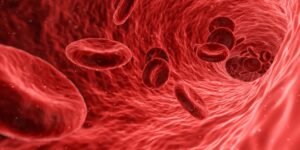
Causes and Signs of Blood Cancer
Blood cancer, also known as hematological cancer, is a type of cancer that affects the production and function of blood cells. It occurs when abnormal cells in the blood start growing uncontrollably, interfering with the normal functioning of the body. There are different types of blood cancer, including leukemia, lymphoma, and multiple myeloma. While the exact causes of blood cancer are not fully understood, there are certain risk factors that have been identified. Additionally, recognizing the signs and symptoms of blood cancer is crucial for early detection and treatment. In this article, we will explore the causes, signs, and preventive measures for blood cancer.
Research has shown that certain genetic mutations and abnormalities play a significant role in the development of blood cancer. These mutations can be inherited or acquired over time due to environmental factors or lifestyle choices. For example, exposure to certain chemicals or radiation can increase the risk of developing blood cancer. Additionally, individuals with a family history of blood cancer are more likely to develop the disease themselves, suggesting a genetic predisposition.
Another factor that contributes to the development of blood cancer is a weakened immune system. People with weakened immune systems, such as those with HIV/AIDS or who have undergone organ transplantation, are at a higher risk of developing blood cancer. This is because a compromised immune system is less effective at recognizing and eliminating abnormal cells in the body.
Recognizing the signs and symptoms of blood cancer is crucial for early detection and treatment. The symptoms can vary depending on the type of blood cancer and the stage of the disease. Common signs include unexplained weight loss, fatigue, frequent infections, easy bruising or bleeding, and swollen lymph nodes. Some individuals may also experience bone pain, night sweats, and shortness of breath. It is important to note that these symptoms can be caused by other conditions as well, so it is essential to consult a healthcare professional for an accurate diagnosis.
Early detection of blood cancer significantly improves the chances of successful treatment and recovery. Therefore, it is important to be aware of the risk factors and symptoms associated with the disease. Regular check-ups, blood tests, and screenings can help identify any abnormalities in the blood cells and prompt further investigation if necessary. Additionally, maintaining a healthy lifestyle, including a balanced diet, regular exercise, and avoiding exposure to harmful substances, can help reduce the risk of developing blood cancer.
In conclusion, blood cancer is a complex disease that can be caused by a combination of genetic and environmental factors. Recognizing the signs and symptoms of blood cancer is crucial for early detection and treatment. By understanding the risk factors and taking preventive measures, individuals can minimize their chances of developing this devastating disease. It is important to consult a healthcare professional for guidance and support in managing and treating blood cancer.
Causes of Blood Cancer
The exact causes of blood cancer are not well-defined, but several risk factors have been identified. These risk factors increase the likelihood of developing blood cancer, although not everyone with these factors will develop the disease. Some of the known risk factors for blood cancer include:
- Genetic Factors: Certain genetic mutations and inherited conditions, such as Down syndrome and Fanconi anemia, can increase the risk of developing blood cancer.
- Exposure to Radiation: High levels of exposure to ionizing radiation, such as radiation therapy for previous cancers or nuclear accidents, can increase the risk of blood cancer.
- Chemical Exposure: Exposure to certain chemicals, such as benzene and formaldehyde, has been linked to an increased risk of blood cancer.
- Family History: Having a family history of blood cancer can increase the risk of developing the disease.
- Age: Blood cancer is more common in older adults, although it can occur at any age.
- Gender: Some types of blood cancer, such as lymphoma, are more common in males, while others, like multiple myeloma, are more common in females.
It’s important to note that having one or more of these risk factors does not necessarily mean that an individual will develop blood cancer. Many people without any known risk factors still develop the disease, while others with multiple risk factors never develop it.
Blood cancer, also known as hematological malignancy, is a complex disease that arises from the abnormal growth and division of blood cells. While the exact causes of blood cancer are not fully understood, researchers have made significant progress in identifying various risk factors that contribute to its development. By understanding these risk factors, healthcare professionals can better assess an individual’s likelihood of developing blood cancer and potentially implement preventive measures.
One of the primary risk factors for blood cancer is genetic factors. Certain genetic mutations and inherited conditions have been found to increase the risk of developing the disease. For example, individuals with Down syndrome have a higher likelihood of developing leukemia, a type of blood cancer. Similarly, Fanconi anemia, an inherited condition that affects the body’s ability to repair damaged DNA, is associated with an increased risk of blood cancer.
In addition to genetic factors, exposure to radiation has also been identified as a risk factor for blood cancer. High levels of ionizing radiation, such as those experienced during radiation therapy for previous cancers or in the aftermath of nuclear accidents, can damage the DNA of blood cells and increase the risk of developing blood cancer. While radiation therapy is a crucial treatment for many cancers, healthcare professionals carefully monitor and minimize the radiation dose to reduce the potential long-term risks.
Chemical exposure is another significant risk factor for blood cancer. Certain chemicals, such as benzene and formaldehyde, have been linked to an increased risk of developing the disease. Benzene, a common industrial chemical found in solvents and fuels, is known to cause changes in the DNA of blood cells, leading to the development of leukemia. Formaldehyde, often used in the production of various products, has also been associated with an increased risk of blood cancer.
Family history plays a role in the development of blood cancer as well. Having a close relative, such as a parent or sibling, who has been diagnosed with blood cancer increases an individual’s risk of developing the disease. This suggests that there may be inherited genetic factors that contribute to the development of blood cancer.
Age is another important risk factor for blood cancer. While the disease can occur at any age, it is more commonly diagnosed in older adults. This may be due to cumulative exposure to various risk factors over time, as well as age-related changes in the body’s immune system and DNA repair mechanisms.
Interestingly, gender also influences the risk of developing certain types of blood cancer. For example, lymphoma, a cancer of the lymphatic system, is more common in males. On the other hand, multiple myeloma, a cancer that affects plasma cells in the bone marrow, is more frequently diagnosed in females. The reasons for these gender differences are not yet fully understood and require further research.
It is important to emphasize that having one or more of these risk factors does not guarantee the development of blood cancer. Many individuals without any known risk factors still develop the disease, while others with multiple risk factors never experience it. The interplay between genetic predisposition, environmental exposures, and other factors that contribute to the development of blood cancer is complex and requires ongoing research to fully comprehend.
Additional Signs and Symptoms of Blood Cancer
In addition to the common signs and symptoms mentioned above, there are other indicators that may suggest the presence of blood cancer. It is important to be aware of these potential symptoms and seek medical attention if they occur:
- Night Sweats: Excessive sweating during the night, often soaking through clothes and bedding, can be a sign of blood cancer.
- Unexplained Fever: Persistent or recurrent fever without any apparent cause may be a symptom of blood cancer.
- Abdominal Discomfort: Unexplained pain, fullness, or swelling in the abdomen can be associated with certain types of blood cancer, such as lymphoma or leukemia.
- Itchy Skin: Intense itching, particularly without any visible rash or irritation, can sometimes be a sign of blood cancer.
- Swollen or Painful Joints: In some cases of blood cancer, the joints may become swollen, tender, or painful.
- Excessive Sweating: Profuse sweating, especially at night, can be a symptom of blood cancer.
- Changes in Appetite: A sudden loss of appetite or feeling full after eating small amounts of food can be associated with blood cancer.
It is important to note that these signs and symptoms can also be caused by other health conditions, and not all individuals with blood cancer will experience them. However, if you notice any of these symptoms persisting or worsening over time, it is crucial to consult a healthcare professional for a proper evaluation and diagnosis.
Early detection of blood cancer is key to improving treatment outcomes and increasing the chances of successful recovery. Therefore, it is essential to be vigilant about any unusual changes in your body and seek medical advice promptly.
Preventive Measures for Blood Cancer
While there is no guaranteed way to prevent blood cancer, there are certain measures that can help reduce the risk. These preventive measures are also beneficial for overall health and well-being. Here are some preventive measures to consider:
- Maintain a Healthy Lifestyle: Adopting a healthy lifestyle can help reduce the risk of various types of cancer, including blood cancer. This includes eating a balanced diet rich in fruits, vegetables, whole grains, and lean proteins. Regular physical activity, such as brisk walking, jogging, or cycling, can also contribute to reducing the risk of blood cancer. Additionally, maintaining a healthy weight and avoiding tobacco and excessive alcohol consumption are crucial in preventing cancer.
- Protect Against Chemical Exposure: Minimize exposure to chemicals linked to an increased risk of blood cancer, such as benzene and formaldehyde. These chemicals are commonly found in certain industries, such as petroleum refining, rubber manufacturing, and chemical production. If you work in such environments, it is important to follow safety guidelines and use protective equipment to minimize exposure. Additionally, individuals should be aware of the potential presence of these chemicals in household products and take necessary precautions.
- Protect Against Radiation: If you require radiation therapy for a previous cancer, discuss the potential risks and benefits with your healthcare provider. Radiation therapy can increase the risk of developing secondary cancers, including blood cancer. However, in many cases, the benefits of radiation therapy outweigh the risks. It is important to follow your healthcare provider’s recommendations and undergo regular screenings to monitor for any potential complications.
- Stay Informed: Educate yourself about the risk factors, signs, and symptoms of blood cancer. While blood cancer can affect anyone, certain factors, such as age, family history, exposure to certain chemicals, and certain medical conditions, can increase the risk. Knowing the signs and symptoms, which may include unexplained weight loss, fatigue, frequent infections, and swollen lymph nodes, can help in early detection and prompt medical attention.
- Know Your Family History: If you have a family history of blood cancer, inform your healthcare provider. Certain genetic factors can increase the risk of developing blood cancer. Your healthcare provider may recommend certain screenings or preventive measures based on your individual risk. Additionally, genetic counseling may be beneficial in understanding your risk and making informed decisions about preventive measures.
- Regular Health Check-ups: Schedule regular check-ups with your healthcare provider to monitor your overall health and detect any potential issues early on. Regular blood tests can help identify any abnormalities in the blood cells, which may indicate the presence of blood cancer or other conditions. Additionally, your healthcare provider may recommend periodic imaging tests, such as CT scans or MRIs, to evaluate the organs and tissues for any signs of cancer.
It’s important to remember that while these preventive measures can help reduce the risk of blood cancer, they do not guarantee complete prevention. Blood cancer can develop due to a combination of genetic, environmental, and lifestyle factors. Regular screenings, early detection, and prompt treatment remain essential for managing and treating blood cancer effectively. If you notice any concerning symptoms or have any questions about your risk of developing blood cancer, consult with your healthcare provider for personalized guidance and support.



